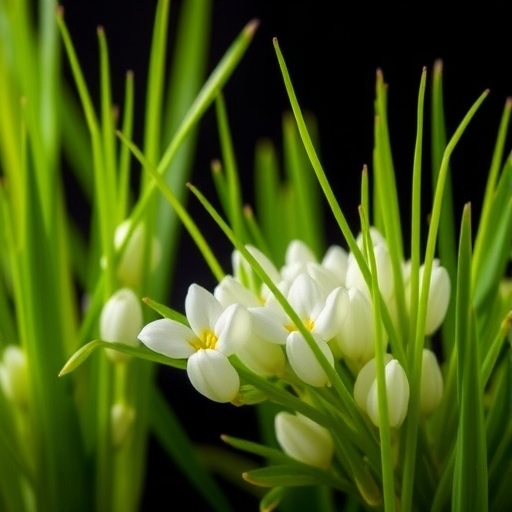In a groundbreaking study, researchers have explored the intriguing relationship between halotolerant microbes and the complex mechanisms of salt tolerance in crops, particularly rice. This exploration has crucial implications for agricultural practices in saline-prone areas, where soil salinity poses a significant threat to crop yields. The work conducted by Ghosh et al. focuses on a specific strain of Staphylococcus, known as MCC 5340, that displays remarkable capabilities in imparting salinity resistance to rice plants. This research could pave the way for innovative biotechnological approaches aimed at enhancing food security in the face of climate change.
Salt stress is one of the primary abiotic challenges faced by rice cultivation globally. As populations continue to grow, the demand for rice rises, and so does the need for viable solutions to combat salinity-induced stress. The innovative approach taken by the authors of this study reveals how a halotolerant bacterial strain can interact with rice to mediate tolerance against high salinity levels. Central to this mechanism is the regulation of ion homeostasis, which is essential for maintaining cellular function under stress conditions.
The researchers utilized a comprehensive methodology comprising plant growth experiments paired with molecular analyses. This approach allowed for an in-depth understanding of the physiological and molecular mechanisms underpinning the interaction between Staphylococcus sp. MCC 5340 and the rice plant. Through their experiments, the team discovered that rice plants treated with MCC 5340 exhibited enhanced growth parameters, even under conditions of elevated salinity. These findings suggest that such microbial applications could significantly improve the resilience of rice crops in challenging environments.
An intriguing aspect of this study is the investigation into how MCC 5340 regulates ion homeostasis. The bacteria appeared to influence the uptake and distribution of critical ions such as sodium and potassium within the rice plant. Maintaining an optimal balance of these ions is crucial, as sodium toxicity can severely disrupt plant physiology while potassium is essential for various metabolic processes. The bacterial strain not only helps to mitigate sodium ions’ uptake but also promotes potassium retention, thereby fostering a more favorable ionic balance within the plant cells.
Moreover, the researchers delved into the gene regulatory networks affected by MCC 5340. The expression levels of various stress-responsive genes were assessed to understand better how this microbial strain modulates the rice plant’s responses to salinity stress. The induction of specific genes involved in antioxidant defense, osmotic adjustment, and ion transport was evident in the treated plants. This highlights a sophisticated interaction whereby bacteria and plants communicate, leading to adaptive changes at the genetic level that enhance stress tolerance.
The implications of employing such halotolerant bacteria in agricultural settings could be monumental. With the increasing salinization of arable land, especially in regions dependent on rice cultivation, finding biological solutions has never been more critical. The researchers advocate for the potential of MCC 5340 to be used as a biofertilizer or a biostimulant, promoting not just rice growth but possibly that of other salt-sensitive crops as well. Such practices could result in more sustainable agricultural systems, reducing the need for synthetic fertilizers and making food production more environmentally friendly.
Furthermore, the study underscores the importance of microbial diversity in promoting plant health and resilience. By leveraging beneficial microbes, farmers can tap into a treasure trove of natural solutions to combat the pressing challenges posed by climate change. This research contributes to the growing field of plant-microbe interactions and emphasizes the potential of harnessing natural biodiversity to enhance agricultural productivity.
In addition, the research team pointed out the necessity of further studies to explore the long-term effects of using Staphylococcus sp. MCC 5340 in field conditions. Outlined are several future directions, including evaluating the impact of environmental variability on the efficacy of this bacterial strain and its interactions with different rice cultivars. Understanding these dynamics will be critical for developing robust strategies for implementing microbial solutions in farming practices.
Through this study, Ghosh et al. have provided new insights into how halotolerant bacteria can serve as an effective tool in modern agriculture. Their findings challenge existing perceptions, proposing that instead of merely searching for salt-resistant plant varieties, researchers should also consider the role of microbes as mediators of stress resilience. The integration of microbial applications in crop cultivation could revolutionize how we approach agricultural sustainability in the coming decades.
As the global community confronts the challenges of feeding an ever-growing population amidst climate uncertainties, innovative solutions like those presented in this research will be vital. Emphasizing collaboration between microbiology and agronomy, this study exemplifies how interdisciplinary research can yield novel approaches to longstanding agricultural problems.
In summary, the exploration of Staphylococcus sp. MCC 5340 is not just an academic exercise; it represents a significant step toward practical solutions that can be implemented at scale. As researchers turn their attention toward harnessing the power of the microbial world to bolster agricultural productivity, this study stands out as a beacon of hope for developing resilient crops capable of thriving in increasingly saline environments.
As we move forward, it will be crucial to ensure that findings from such pioneering studies are communicated clearly and effectively to stakeholders in the agricultural sector. This includes farmers, policymakers, and researchers alike, who must work together to translate these innovative solutions into actionable practices on the ground. The future of agriculture may very well hinge on our understanding of microbial relationships and their potential to enhance crop resilience in an ever-changing climate.
Subject of Research: Halotolerant bacteria’s impact on salinity tolerance in rice.
Article Title: Halotolerant Staphylococcus sp. MCC 5340 confers salinity tolerance in rice through the regulation of ion homeostasis and stress-responsive genes.
Article References: Ghosh, S.K., Ghosh, P.K., Pal, P. et al. Halotolerant Staphylococcus sp. MCC 5340 confers salinity tolerance in rice through the regulation of ion homeostasis and stress-responsive genes. Int Microbiol (2025). https://doi.org/10.1007/s10123-025-00729-5
Image Credits: AI Generated
DOI: https://doi.org/10.1007/s10123-025-00729-5
Keywords: Halotolerant bacteria, Staphylococcus, salinity tolerance, rice, ion homeostasis, stress response, agricultural sustainability.




